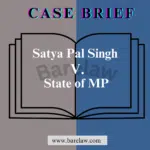
Table of Contents
Om Parkash v. State of Punjab
Date of Decision
April 24, 1961
Facts
Om Parkash v. State of Punjab is a case that deals with the offense of attempting to murder under Section 307 of the Indian Penal Code. The following are the facts of the case:
- The Accused: The accused in the case was Om Parkash.
- The Offense: The accused was charged with attempting to murder B under Section 307 of the Indian Penal Code.
- The Trial Court: The trial court acquitted the accused, finding that the prosecution had failed to prove that the accused had the intention to cause the death of B.
- The High Court: On appeal, the High Court convicted the accused and sentenced him to seven years of rigorous imprisonment.
- The Appeal: The accused appealed the conviction to the Supreme Court of India.
- The Ruling: The Supreme Court held that the prosecution had failed to prove that the accused had the intention to cause the death of B. The Court, therefore, set aside the conviction and acquitted the accused.
In summary, Om Parkash v. State of Punjab is a case that deals with the offense of attempting to murder under Section 307 of the Indian Penal Code. The case involved the accused being charged with attempting to murder B, but the Supreme Court held that the prosecution had failed to prove that the accused had the intention to cause the death of B. The Court, therefore, set aside the conviction and acquitted the accused.
Issues
Om Parkash v. State of Punjab is a case that deals with the offense of attempting to murder under Section 307 of the Indian Penal Code. The following are the issues of the case:
- Attempt to Murder: The case deals with the offense of attempting to murder under Section 307 of the Indian Penal Code. The accused was charged with attempting to murder B under Section 307 of the Indian Penal Code.
- Intent to Murder: The case determines whether the accused had the intention to cause the death of B. The prosecution must prove that the accused had the intention to commit the offense.
- Acquittal: The trial court acquitted the accused, but on appeal, the High Court convicted him and sentenced him to seven years of rigorous imprisonment.
- Appeal: The accused appealed the conviction to the Supreme Court of India.
- Holding: The Supreme Court held that the prosecution had failed to prove that the accused had the intention to cause the death of B. The Court, therefore, set aside the conviction and acquitted the accused.
- Importance: The case established that mere intention cannot be a sufficient ground to prove a person guilty of an offense. The prosecution must prove that the accused had taken some step towards the commission of the offense to constitute an attempt.
In summary, the Om Parkash v. State of Punjab case deals with the offense of attempting to murder under Section 307 of the Indian Penal Code. The case established that the prosecution must prove that the accused had taken some step towards the commission of the offense to constitute an attempt. The Supreme Court held that the prosecution had failed to prove that the accused had the intention to cause the death of B. The Court, therefore, set aside the conviction and acquitted the accused.
Holding
The holdings of the Om Parkash v. State of Punjab case are as follows:
- The accused was charged with attempting to murder B under Section 307 of the Indian Penal Code.
- The trial court acquitted the accused, but on appeal, the High Court convicted him and sentenced him to seven years of rigorous imprisonment.
- The Supreme Court held that the prosecution had failed to prove that the accused had the intention to cause the death of B.
- The Court held that a person commits an offense under Section 307 of the Indian Penal Code when he has an intention to commit murder and in pursuance of that intention does some overt act towards its commission.
- The Court held that mere intention cannot be a sufficient ground to prove a person guilty of an offense. The prosecution must prove that the accused had taken some step towards the commission of the offense to constitute an attempt.
- The Court, therefore, set aside the conviction and acquitted the accused.
Disposition
Om Parkash v. State of Punjab is a case that deals with the offense of attempting to murder under Section 307 of the Indian Penal Code. The accused was charged with attempting to murder B under Section 307 of the Indian Penal Code. The trial court acquitted the accused, but on appeal, the High Court convicted him and sentenced him to seven years of rigorous imprisonment. The accused appealed the conviction to the Supreme Court of India.
The Supreme Court held that the prosecution had failed to prove that the accused had the intention to cause the death of B. The Court held that a person commits an offense under Section 307 of the Indian Penal Code when he has an intention to commit murder and in pursuance of that intention does some overt act towards its commission. The Court held that mere intention cannot be a sufficient ground to prove a person guilty of an offense. The prosecution must prove that the accused had taken some step towards the commission of the offense to constitute an attempt.
The Court, therefore, set aside the conviction and acquitted the accused. In summary, the Om Parkash v. State of Punjab case deals with the offense of attempting to murder under Section 307 of the Indian Penal Code. The Supreme Court held that the prosecution had failed to prove that the accused had the intention to cause the death of B and acquitted him of the charges. The case established that mere intention cannot be a sufficient ground to prove a person guilty of an offense. The prosecution must prove that the accused had taken some step towards the commission of the offense to constitute an attempt.
Summary
Om Parkash v. State of Punjab is a case that was heard by the Supreme Court of India in 1961. The case deals with the offense of attempting to murder under Section 307 of the Indian Penal Code. The accused in the case was Om Parkash. The accused was charged with attempting to murder B under Section 307 of the Indian Penal Code. The trial court acquitted the accused, finding that the prosecution had failed to prove that the accused had the intention to cause the death of B.
On appeal, the High Court convicted the accused and sentenced him to seven years of rigorous imprisonment. The accused appealed the conviction to the Supreme Court of India. The Supreme Court held that the prosecution had failed to prove that the accused had the intention to cause the death of B. The Court held that a person commits an offense under Section 307 of the Indian Penal Code when he has an intention to commit murder and in pursuance of that intention does some overt act towards its commission.
The Court held that mere intention cannot be a sufficient ground to prove a person guilty of an offense. The prosecution must prove that the accused had taken some step towards the commission of the offense to constitute an attempt. The Court, therefore, set aside the conviction and acquitted the accused.
In summary, Om Parkash v. State of Punjab is a case that deals with the offense of attempting to murder under Section 307 of the Indian Penal Code. The Supreme Court held that the prosecution had failed to prove that the accused had the intention to cause the death of B and acquitted him of the charges. The case established that mere intention cannot be a sufficient ground to prove a person guilty of an offense. The prosecution must prove that the accused had taken some step towards the commission of the offense to constitute an attempt.



